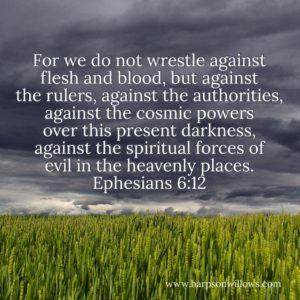Have you heard of the psychological concept of projecting? “Projecting” assigns, or projects, our own emotions and thoughts on to another person and unconsciously accepts those emotions and thoughts as belonging to the other person.
Projecting occurs with thoughts about and/or feelings toward:
- Others
- Ourselves
- Family situation
- Events
- Work
- Pets
- Natural disasters
- Religion
- Etc.
Practically anything and practically any thought or feeling can be projected onto practically anyone.
For instance, I absolutely love cats. All of them. And in the past I have projected my love of cats on other people. I mean, why wouldn’t all people adore these precious little fuzzballs, right? But as hard as it is to believe, not everyone is a cat lady, or man. (What?)
If Only My Projecting Stopped At Cats
In my life, I have projected plenty of my feelings on God.
- God, how can you stand a loser like me?
- God, I wouldn’t answer my prayers either.
- God, I agree that I should be punished with this situation.
- God, since You put me in this horrible place, I must deserve to be here.
Honestly, it makes me sad when I remember the times I thought like this. If you think like this today, know that you are projecting your thoughts onto God. Even more importantly, know that He does not think this way about His beloved children.
Our human thoughts are fallen. That is why we must take our thoughts captive to Christ.
As Paul says:
For though we walk in the flesh, we are not waging war according to the flesh. 4 For the weapons of our warfare are not of the flesh but have divine power to destroy strongholds. We destroy arguments 5 and every lofty opinion raised against the knowledge of God, and take every thought captive to obey Christ, 6 being ready to punish every disobedience, when your obedience is complete. 2 Corinthians 10:3-6
Our primary weapons of warfare are prayer and reading the Bible. Other weapons include gathering regularly with a church community, confessing thoughts to a TRUSTED Christian friend(s) (and I would add, only after confessing and discussing the issue with God), listening to Christian music, meditating, reading Christian literature, and journaling—and this is by no means a complete list.
Our Mind Is A Battlefield
Pat Benatar said that “Love is a Battlefield.” In this iconic song, she indicates that one primary reason for this is because “We are strong, no one can tell us we’re wrong.” Humans are strong, very strong-minded and strong-willed, that is. Too many times we walk by sight and not by faith. As Christians, we may have some battlefields regarding love, but our primary battlefield is the mind.
The Battlefield of the Mind
In the book “The Battlefield of the Mind” Joyce Meyer teaches that the mind is the primary place of Satan’s attack on the individual. This principle is stated clearly in Paul’s letter to Rome:
Those who are dominated by the sinful nature think about sinful things, but those who are controlled by the Holy Spirit think about things that please the Spirit. 6 So letting your sinful nature control your mind leads to death. But letting the Spirit control your mind leads to life and peace. 7 For the sinful nature is always hostile to God. It never did obey God’s laws, and it never will. 8 That’s why those who are still under the control of their sinful nature can never please God. (Romans 8:5-8)
If we can be convinced that what God has revealed to us in His Word is NOT true, then we have effectively entered unbelief, distrust, the danger zone of thinking it is okay to eat the fruit—lofty opinions raised against the knowledge of God.
These thoughts condemn and attack. And no matter how often we tell ourselves they are not true, they worm their way into our heart, causing decay in our spiritual life.
Look at what John says regarding thoughts that tell us we are not good enough, or that we deserve what happened, or that God doesn’t hear our prayers, etc.:
By this we shall know that we are of the truth and reassure our heart before him; 20 for whenever our heart condemns us, God is greater than our heart, and he knows everything. 21 Beloved, if our heart does not condemn us, we have confidence before God; 22 and whatever we ask we receive from him, because we keep his commandments and do what pleases him (1 John 3:19-22).
Look closely at verse 20: “for whenever our heart condemns us, God is greater than our heart, and he knows everything.”
The word translated “condemn” is important for grasping exactly what John is saying. Please bear with me here—you will be so glad you did.
Condemn and Condemn in the NT
In the NT, there are two different Greek words translated “condemn.” They are
katakrinō
kataginōskō
Notice that both words translated “condemn” begin with the same four (4) letters: kata.
Both words are Greek compounds, which are normally formed by prefixing a verb with a preposition. In this case the preposition is kata and carries the meaning “down upon, toward, against someone or something.”
The verbal portion of these compounds mean:
krinō = to judge, decide, propose
ginōskō = To come to know, understand, know
Kata + krinō = against judge, against decide, etc.
Kata + ginōskō = against coming to know, against understanding, against knowing, etc.
Against Judge Condemn
katakrinō is found several places in the NT. Here are 3 examples:
Romans 2:1 Therefore you have no excuse, O man, every one of you who judges. For in passing judgment on another you condemn yourself, because you, the judge, practice the very same things.
Hebrews 11:7 By faith Noah, being warned by God concerning events as yet unseen, in reverent fear constructed an ark for the saving of his household. By this he condemned the world and became an heir of the righteousness that comes by faith.
2 Peter 2:6 if by turning the cities of Sodom and Gomorrah to ashes he condemned them to extinction, making them an example of what is going to happen to the ungodly.
Katakrinō “condemn” means to judge against. The Roman Jews’ actions were judging against themselves. Noah’s faith judged against the world. Sodom and Gomorrah were judged against through fire.
Against What You Have Come To Know Condemn
Kataginōskō is used only in 1 John in the verses we looked at earlier:
1 John 3:19-22 By this we shall know that we are of the truth and reassure our heart before him; 20 for whenever our heart condemns us, God is greater than our heart, and he knows everything. 21 Beloved, if our heart does not condemn us, we have confidence before God; 22 and whatever we ask we receive from him, because we keep his commandments and do what pleases him (1 John 3:19-22).
So already you see where I’m going. Right?
Kataginōskō “condemn” means against what you have come to know, against understanding, against knowing.
This explains why John seems to randomly add that God knows everything. He is using sound to make this statement stand out, to make it memorable for his audience: “whenever our hearts speak against what we have come to know, God is greater than our heart, and He knows everything.” (!)
That is so good. Let’s reread substituting “condemn” and highlighting all the normal uses of “know.”
1 John 3:19-22 By this we shall know that we are of the truth and reassure our heart before him; 20 for whenever our heart speaks against what we have come to know (condemn), God is greater than our heart, and He knows everything. 21 Beloved, if our heart does not speak against what we have come to know (condemn), we have confidence before God; 22 and whatever we ask we receive from him, because we keep his commandments and do what pleases him.
See? The battlefield of the mind—lofty opinions opposing the knowledge of God—worm their way into the heart. John wrote this to encourage Christian believers approximately 2000 years ago, and it is equally encouraging to us today.
When our hearts are against what we know to be the truth of God, we must take our thoughts captive to Christ, because God is greater than our hearts. Though our hearts may condemn us, God will reassure us. This builds our confidence before God, that is our faith, trust, hope, and love.
Lofty Thoughts vs. Lining Up Our Thoughts
Meyer says “Lining up our thoughts with God’s thoughts is vital to overcoming negative thoughts from Satan and brings freedom and peace. We must know God’s Word well enough to be able to compare what is in our mind with what is in the mind of God; any thought that attempts to exalt itself about the Word of God we are to cast down and bring into captivity to Jesus Christ. This process takes time.”
We shouldn’t project our thoughts on others and especially not on God. Indeed, we can see why Paul called them “lofty” because we our putting our thoughts and opinions above what God has said. Think about it: our thoughts vs. God’s thoughts?
When your thoughts think something contrary to the knowledge of God, rebuke the thought, choose not to believe it. Tell yourself the truth of God’s Word. Physician, heal thyself! Choose to believe the truth. Choose to believe God.
Prayer: God thank you for forgiving my foolishness and audacity to think lofty thoughts–thoughts that I put above what I know about You through the revelation of Your Word. Help us all Father, to gain control of our mind, to walk by faith and not by sight. Everything on this earth is SO in our face all the time. Help the time when we have our own faces in Your Word, that the time may be productive, uplifting, and transforming. Help us NEVER to believe our worldly situation but to take our thoughts captive to Christ and to trust Him. In Jesus Name. Amen.
Until next time –
The grace of the Lord Jesus Christ and the love of God and the fellowship of the Holy Spirit be with you all. 2 Corinthians 13:14



